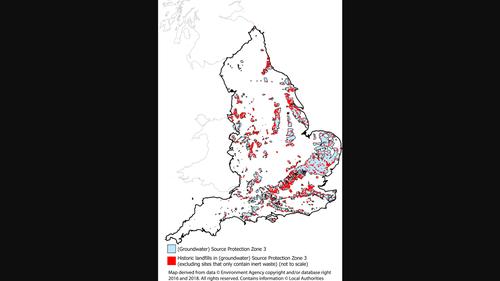Potential pollution risks of historic landfills in England: Further analysis of climate change impacts
引用次数: 0
Abstract
Five years ago, an article in WIREs Water provided the first comprehensive analysis of historic (legacy) landfill sites vulnerable to coastal flooding and erosion at a national scale (England). This update expands upon that article by considering the potential impacts of climate change upon inland historic landfills. Globally, there are hundreds of thousands of landfills that predate modern environmental regulations, and where waste is not isolated from the surrounding environment, but climate change impacts on the pollution risk from historic landfills in freshwater environments has received little attention. Where climate change causes an increase in the frequency and magnitude of fluvial flood events, this will increase leachate generation and the probability of landfill erosion and solid waste release. Where there is increased drought the landfill capping materials may crack, opening up new pollutant pathways, and increasing the risk of solid waste release. Changes to groundwater movement resulting from climate change may open new leachate pathways, and in England alone, thousands of historic landfills are in (groundwater) Source Protection Zones where modern regulations to protect drinking water supplies would not permit their construction. This increased contaminant release from historic landfills in freshwater environments may impact surface and/or groundwater quality and ecological health, increase costs for drinking water monitoring/treatment, or make some abstraction sources unviable. This is especially of concern where receptors are subject to multiple pressures and may cause tipping points to be reached. Further research is warranted into contaminant behavior, receptor vulnerability, historic landfill risk prioritization, and mitigation/remediation methods.This article is categorized under: Engineering Water > Engineering Water Science of Water > Water Quality Science of Water > Water and Environmental Change Water and Life > Stresses and Pressures on Ecosystems

英格兰历史垃圾填埋场的潜在污染风险:气候变化影响的进一步分析
五年前,《WIREs Water》上的一篇文章首次在全国范围内(英格兰)对易受沿海洪水和侵蚀影响的历史(遗留)垃圾填埋场进行了全面分析。本次更新在该文章的基础上,考虑了气候变化对内陆历史垃圾填埋场的潜在影响。在全球范围内,有成千上万个垃圾填埋场在现代环境法规出台之前就已存在,而且这些垃圾填埋场并未与周围环境隔离,但气候变化对淡水环境中历史垃圾填埋场污染风险的影响却很少受到关注。如果气候变化导致河流洪水事件的频率和规模增加,则会增加沥滤液的产生以及垃圾填埋场被侵蚀和固体废物排放的可能性。在干旱加剧的情况下,垃圾填埋场的覆盖材料可能会开裂,从而打开新的污染物通道,增加固体废物泄漏的风险。气候变化导致的地下水运动变化可能会打开新的沥滤液通道,仅在英格兰,就有数千个历史垃圾填埋场位于(地下水)水源保护区内,而现代饮用水供应保护法规不允许在这些地方建造垃圾填埋场。淡水环境中历史垃圾填埋场污染物释放量的增加可能会影响地表水和/或地下水的质量及生态健康,增加饮用水监测/处理的成本,或使某些取水源变得不可行。在受体受到多重压力的情况下,这一点尤其值得关注,并可能导致达到临界点。有必要对污染物行为、受体脆弱性、历史垃圾填埋场风险优先级以及缓解/修复方法进行进一步研究。本文归类为:工程水 > 工程水水科学 > 水质水科学 > 水与环境变化水与生命 > 生态系统的压力和应力
本文章由计算机程序翻译,如有差异,请以英文原文为准。
求助全文
约1分钟内获得全文
求助全文

 求助内容:
求助内容: 应助结果提醒方式:
应助结果提醒方式:


